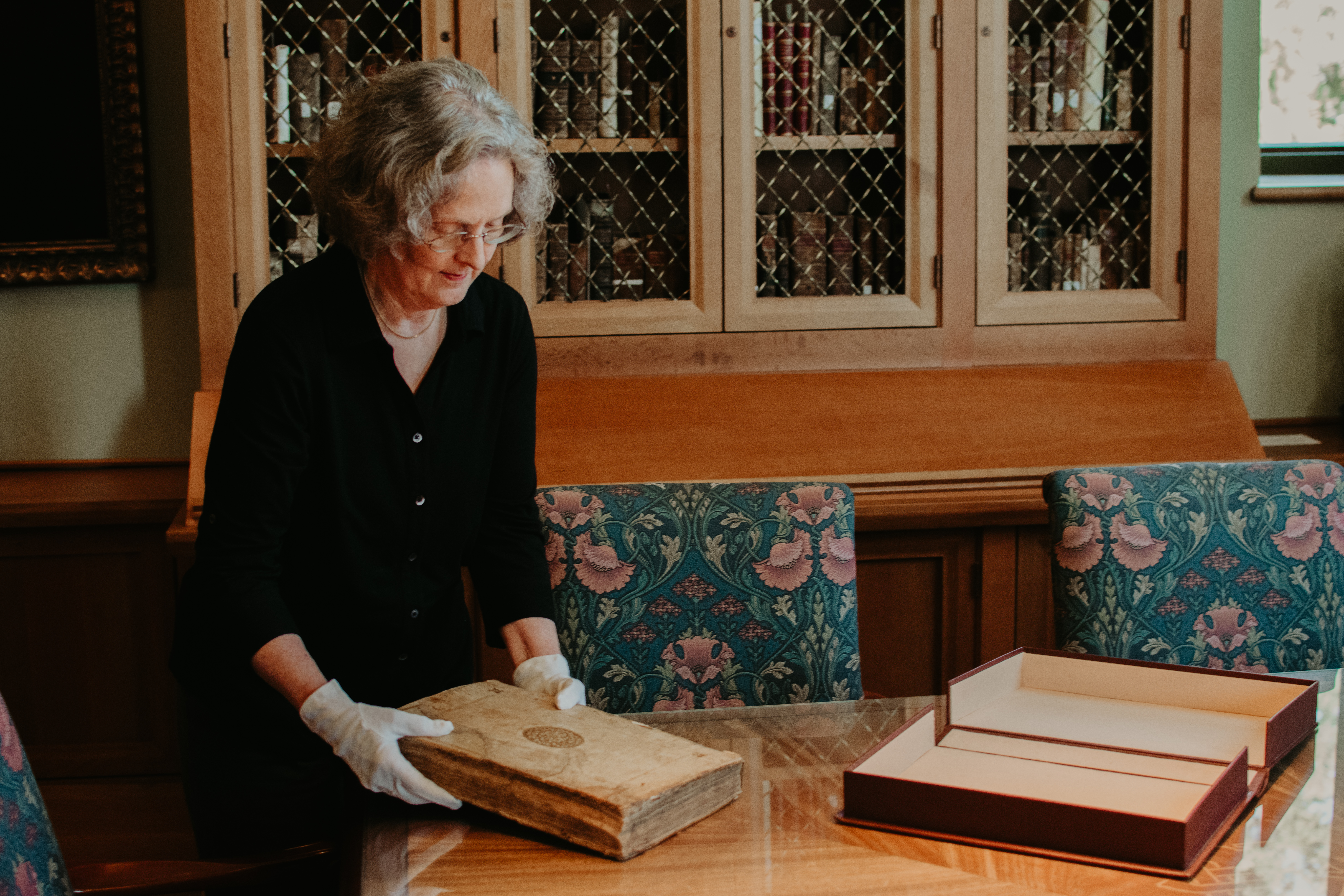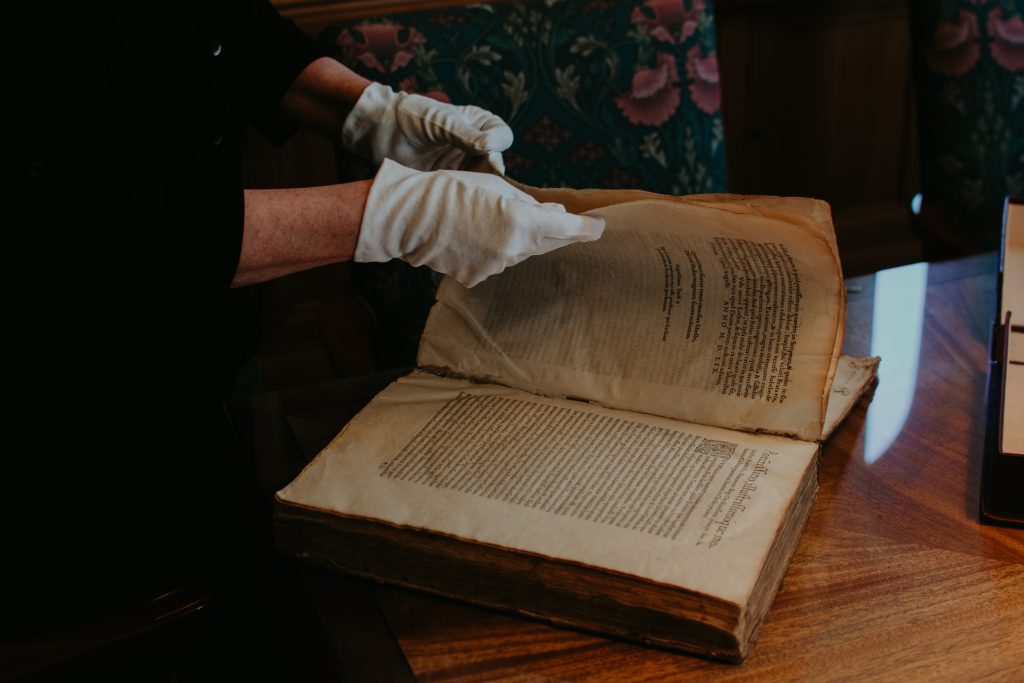In “Reference” to Paula Skreslet

Staff Spotlight
BY EMMA NORTH
The William Smith Morton Library at Union Presbyterian Seminary offers a remarkable collection of resources not available anywhere else. You could argue one of the most important resources is Paula Youngman Skreslet. She is the reference librarian and without her, the average visitor may never know the depth and value of the library’s collection.
Skreslet’s job is helping seminarians and other library users utilize the library for studying and research.
“We take very seriously the responsibility to train and equip pastors for the church and for other ministries,” Skreslet says.
She also is in charge of the library’s archives. The archives hold institutional records, manuscripts, faculty papers and rare books. Skreslet says she feels entirely at home in the Rare Book Reading Room and in all the little behind-the-scenes workspaces.

Paula Skreslet pages through the library’s rare 1559 edition of Jean Calvin’s “Institutes of the Christian Religion.” It was the last printing produced in Geneva during Calvin’s lifetime and under his supervision. Of the five revisions of the book, 1559 is considered the definitive edition. Photos by Mollie Trainum
In addition to working for Union is she also an alumna. Skreslet’s husband, Stan Skreslet, had completed a Trial Year Fellowship at Union. He enjoyed it so much that they decided to make the move all the way from Oregon to Virginia to enroll at Union. Skreslet has her Master of Divinity and Doctor of Ministry from Union.
She also has a bachelor’s in religion and German literature and a Master of Science from the Graduate School of Library and Information Sciences at the University of Illinois.
“A reference librarian needs an understanding of library management and practices, the ethos of the profession, and subject-area knowledge in their field,” Skreslet says. “So, having two graduate degrees is not unusual.”
After completing their studies, Skreslet and her husband were invited to work in Egypt by the Evangelical Theological Seminary in Cairo. Skreslet worked as the primary librarian there.
Once they returned from Egypt, they both accepted positions at Union.
Union is an unusual seminary because it exists as its own entity and not as a department for a larger university. This requires Union to collect a sufficient amount of materials for seminarians and faculty to conduct their research. In addition to this, they provide resources for people outside of the seminary. “Union was the premier institution of the PCUS for many years and we feel a special responsibility to document the history and life of the Presbyterian Church in the South,” Skreslet says.
This stand-alone collection boasts remarkable books that have been gifted to the seminary or bought when they have become available. “Several rare book dealers know the particular subject areas we are interested in, such as the Reformation, and they notify us when something pertinent becomes available,” Skreslet says.
There are about 6,000 volumes in the Morton Library collection that need special care. These books are handled with particular care for many reasons. They are usually either very scarce, old, or historically significant and in delicate condition. These books are kept in the Rare Book Room where they receive the security, climate control, and handling they need.
The oldest book in the Rare Book Room dates back to 1470. “One of the most significant ones for our school is the 1559 edition of Jean Calvin’s “Institutes of the Christian Religion,” Skreslet says. Of the five revisions of the book, 1559 is considered the definitive edition. The book currently in the Morton library was the last printing produced in Geneva during Calvin’s lifetime and under his supervision. This copy was previously owned by Cornelius Bertram of Thouars, a French Protestant scholar and the editor of the 1588 French Geneva Bible. “Our copy is meticulously annotated in ink in the margins, in Bertram’s own handwriting. These personal ties make a precious volume like that one much more meaningful,” Skreslet says.
Skreslet says in addition to seminary students and faculty, about 300 local pastors and Christian educators are members of the Morton Library. They also provide digital access to their collection by scanning books for researchers to use. “We lend seven times as many books through interlibrary loan as we receive, which gives you an idea of the depth of this collection,” Skreslet says.
Skreslet says that current students, faculty, and staff have access to “hundreds of databases, thousands of electronic journals and numerous e-books and other digital resources.” Anyone who visits the library can access the digital collections while there in person.
The most exciting part of the digitization process for Skreslet is working on making some of the inaccessible and unique pieces from the Morton Library available online as part of the Hal Todd Library Without Walls project. “In 2015, a group of friends and donors agreed to help the seminary raise the necessary funds to expand the library’s reach to many more users,” says Skreslet. “They appreciated the fact that an effective library is the heart of a high-caliber educational institution, especially one like Union that serves not only its faculty, students and alums but also the church and the wider scholarly community.”

